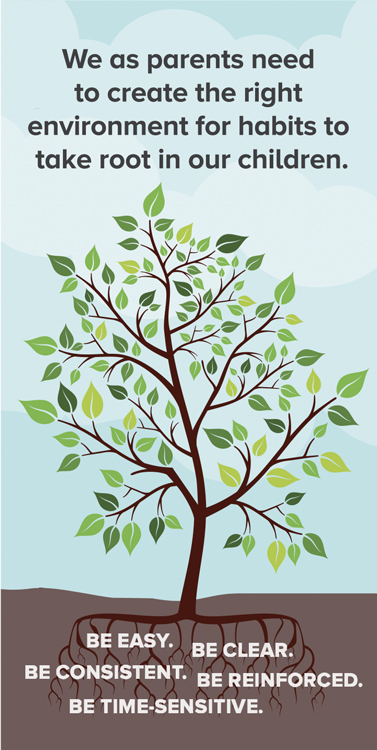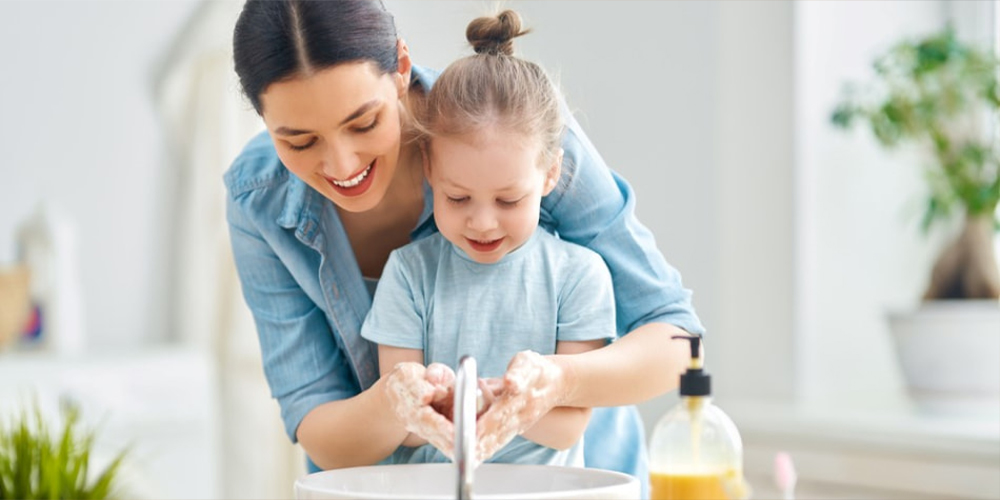 |
I consider myself an organized person, but when it comes to parenting, I often feel like a firefighter living in a house full of arsonists, running around putting out one fire after another. Then I read an article like the one below, and I wonder if it needs to be that way. Perhaps we could avoid some fires if we help our kids develop the right habits (or if I do!). It’s going to take some work, but I think it’s worth a try. The only question is . . . which habit do we tackle first?
— Nicole Balza

From early on, we teach our children this biblical truth: “Every good and perfect gift is from above” (James 1:17). Our bodies, our minds, our gifts, our talents, our money, our “things” are all gifts from God and therefore should be treasured and cared for in a way that shows gratitude and glorifies him. This is an important truth for all of us to remember, but how do we encourage this principle in our children? Where do we start? We start with habits.
Positive, healthy habits are a great way to ensure we are being good stewards of the blessings God has given us. Do you find your child (or you!) wasting too much time playing video games or scrolling through social media? Or eating way too much junk food? Or spending too much money on things the world says we just can’t live without? When we do these things, we squander our blessings and miss opportunities to use all of these things to glorify God, fulfill his purpose for us, and serve others. Having these conversations with our children and making connections between our behaviors and our blessings is a wonderful way to help them understand the importance of positive, healthy habits from a Christian perspective. It becomes less about Mom and Dad nagging and more about honoring God. A clean house, healthy body, and smooth-running household are just bonuses.
New habits don’t start naturally. It’s kind of like growing a plant. A tiny seed needs to be nurtured and given the right environment to grow deep roots and eventually thrive on its own. When a habit is solidly formed, it occurs automatically, thriving on its own, with little conscious thought. Prior to this autopilot state, however, we as parents need to create the right environment for habits to take root in our children. By taking the time to create the right environment, we are setting our children up for success and allowing the opportunity for these habits to grow deep roots and thrive on their own. We can develop this optimal environment by establishing habits that are clear, consistent, time-sensitive, easy, and reinforced.
Be clear

When expectations are vague (clean your room, clean the kitchen, take care of the dog), parents run the risk of frustrating their children and themselves. Children don’t know exactly what is expected, and parents get frustrated that their children aren’t mind readers and don’t complete the task as expected. For a habit to stick, it needs to be clear and specific. Instead of saying, “Clean your room,” try saying, “Make sure your bed is made, your dirty clothes are in the hamper, your toys are where they belong, and there is nothing on the floor.” This gives your children specific expectations so they know exactly when the task has been completed. Parents benefit by ensuring the completed task meets expectations.
Be consistent
People often ask me how long it takes for a task to become a habit. The answer has less to do with time and more to do with consistency. When there is consistency with expectations, the task being completed, and positive reinforcement of the completed task, the habit will form sooner. It’s important to recognize that while habits appear to be behaviorally driven, neurological connections are actually being formed within the brain that eventually allow these habits to occur automatically. These neurological connections thrive on consistency and feedback. In a nutshell, the more we are consistent, the quicker these neurological connections will form and the sooner a task will become a habit.
Be time-sensitive
Open-ended habits with no deadline become easy to delay, postpone, and even avoid. “I’ll exercise later.” “I’ll clean my room later.” Habits have a higher likelihood of developing when we eliminate the element of thinking about when we want to complete the task. Instead of saying, “We’ll do a family devotion this week,” you can say, “Every night, after the dinner dishes are taken care of, we will do a family devotion.” Even if the time has to change on certain days to accommodate scheduling conflicts, the expectation of when the habit will occur should always be clearly stated.
Be easy
Our sinful nature will always resist doing difficult things. We are in constant pursuit of the path of least resistance. It’s why “life hacks” are so wildly popular. When we’re trying to develop habits, they need to be easy to complete. It’s hard (and frustrating) for children to clean their rooms if their closets and drawers are overstuffed, there are no hangers to hang up clean clothes, and things don’t have a designated home. Set your child up for success by starting with a clean slate. This means making sure everything has a home and the tools (i.e., hangers, bins, space, etc.) are available to get each item back to its home easily. This eliminates the frustration of having to figure out where each item is going to go each time. The bonus is that it also makes it easier to find items the next time you need them. These steps will eliminate the obstacles of completing a task and increase the likelihood it will be repeated.
Be reinforced
Especially as children are developing habits, positive reinforcement and validation are important motivators to keep them inspired to keep working. Remember, there is a learning curve involved. It’s not going to be perfect immediately. Parents should acknowledge progress not perfection. Verbal praise and visual cues are helpful. Make simple lists so children have visual reminders of their responsibilities. Tracking charts, where children can cross out tasks or put stickers each time they complete a task, are great for children to see the progress they’ve made and encourage continued effort and improvement. Keeping these resources in high-traffic areas provides repeated reminders and feedback to your children throughout the day.
“Let us not become weary in doing good, for at the proper time we will reap a harvest if we do not give up” (Galatians 6:9). Over time, as a habit becomes more ingrained, less nurturing is required to keep it going. The roots will grow deep, and it can thrive on its own. While it may take a little more effort on the parents’ part initially to create systems and an environment conducive to developing positive habits for children, the benefits are worth the effort. Not only will your children be able to contribute to the daily activities within your home, but they are also internalizing the value and positive impact of habits that will set them up for a lifetime of opportunities to serve God and be great stewards of his blessings.
Karrie Balza
Author: Karrie Balza
Volume 110, Number 3
Issue: March 2023
- Parent conversations: How can parents and kids manage stress?
- Parent conversations: What do your prayers for your children include?
- Parent conversations: How do we resist making our parenting law-based?
- Parent conversations: What Bible passages do you turn to most as a parent?
- Parent conversations: How can we help kids develop positive, healthy habits?
- Parent conversations: What tactics do you use to encourage children to tackle difficult tasks?
- Parent conversations: How can we model good listening skills for our kids?
- Parent conversations: How do we help our kids move on from mistakes?
- Parent conversations: How can we instill gratitude in our children?
- Parent conversations: How can parents find the balance between being too restrictive and too permissive?
- Parent conversations: How can we teach kids to be good friends?
- Parent conversations: What life skills will help young people as they transition to adulthood?
- Parent conversations: How do we discuss death with our children?
- Parent conversations: What does it look like for a father to be a strong Christian leader?
- Parent conversations: How can we help young adults stay engaged in the church?
- Parent conversations: What do parents need to know about video games?
- Parent conversations: How do parents not let worry get the best of them?
- Parent conversations: How do we teach our kids to value all people?
- Parent conversations: When parenting philosophies differ
- Parent conversations: How can we help today’s overwhelmed teens?
- Parent conversations: How can parents maintain a healthy marriage?
- Parent conversations: You might be a Lutheran parent if . . .
- Parent conversations: Parenting post–high school: What is a parent’s role?
- Parent conversations: How can families use the hymnal in their worship life at home?
- Parent conversations: What should Christian parents teach their children about gender?
- Parent conversations: What is vocation? How does it apply to parenting?
- Parent conversations: Why do siblings fight? How should I react when they are fighting?
- Parent conversations: How do we teach children resilience?
- Parent conversations: How do I approach vaccines as a Christian parent?
- Parent conversations: How can I explain the Sixth Commandment to a young child?
- Parent conversations: How can I help my child have an optimistic outlook?
- Parent conversations: What if we can’t follow our Christmas traditions this year?
- Parent conversations: What are ways to foster a rich prayer life in children?
- Parent conversations: How can I let the gospel shine as I parent?
- Parent conversations: How should I handle a child’s separation anxiety?
- Parent conversations: How should families prepare to go back to school?
- Parent conversations: How does a teen’s brain work?
- Parent conversations: How much should I monitor my child online?
- Parent conversations: How can parents reassure children during an uncertain time?
- Parent conversations: How can I stay calm when my child is out of control?
- Parent conversations: Should I give something up for Lent?
- Parent conversations: How can I keep my child engaged in attending church?
- Parent conversations: How can we help a stressed-out kid?
- Parent conversations: How can we nurture a proper view of “stuff”?
- Parent conversations: How involved should parents be in a child’s homework?
- Heart to heart: Parent conversations: Are we modeling kindness for our children?
- Heart to heart: Parent conversations: What’s the best parenting advice you’ve received or given?
- Heart to heart: Parent conversations: How should we handle it when people undermine our parenting decisions?
- Parent conversations: How can we prepare children for summer camp?
- Heart to heart: Parent conversations: What’s a parent’s role as a child dates?
- Heart to heart: Parent conversations: How do parents find contentment?
- Heart to heart: Parent conversations: How can we help a family with a sick parent?
- Heart to heart: Parent conversations: How can parents model healthy cell phone use?
- Parent conversations: How can we protect kids without scaring them?
- Parent conversations: What does your family’s bedtime routine look like?
- Parent conversations: What do I need to consider before I give my child a cell phone?
- Parent conversations: How can we teach gentleness and strength at the same time?
- Parent conversations: What should we do when our children grow silent?
- Parent conversations: What should we teach our children about the Reformation?
- Parent conversations: Do we want our children to be leaders or followers?
- Parent conversations: How does a parent’s role change over time?
- Parent conversations: How should I handle a disagreement with my child’s teacher?
- Parent conversations: What are the building blocks of a strong parent/child relationship?
- Parent conversations: What is our goal as parents?
- Parent conversations: What Christmas traditions do you cherish in your family?
- Parent conversations: How can we raise a generation that cherishes life?
- Parent conversations: What are the best Bible story books for family devotions?
- Parent conversations: Why should children obey their parents?






